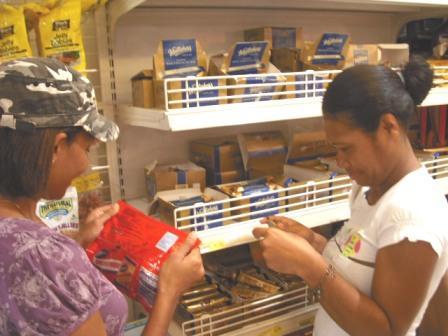
The Council maintains rigorous research practices on important issues affecting consumers. The Council through its research provide evidence based submissions to government and policy makers to effectively develop strategies for appropriate intervention and redress. Evidence based research also assists in advocacy for behavioral change amongst consumers and traders. In addition to research, the Council also conducted regular market surveillance to keep business practices in check.
Copyright
Fiji’s copyright laws disadvantage consumers: CI Survey

Consumers International (CI) has opened up new frontiers to define consumer’ access to knowledge that laws may conventionally prohibit. Fiji has been rated Grade “C” by the 2010 CI’s Intellectual Property (IP) Watchlist after an international survey on the state of access to knowledge found that the copyright laws and enforcement practices of this country poses a barrier to consumers’ access to knowledge.
CI’s IP Watchlist is a global snapshot of how national IP and copyright laws serve or subvert consumer interests. For 2010, CI conducted a survey on the state of access to knowledge or A2K, for short, in 34 countries around the world including Fiji.
These were based on 60 criterias-some of which were freedom to access and use of copyright materials by home users, for education online, by content creators, by the press, libraries, by disabled users, in public affairs and freedom to share and transfer copyright material. Grad A represents a good score that shows that consumers’ interests are being observed in particular criteria while B, C and D are progressively not so good and F is a fail.
The two categories that Fiji’s copyright laws failed miserably and received grade F were freedom to access and use by disabled users and freedom to share information and knowledge with their neighbours. This means that Fiji is doing very little to promote consumers’ freedom to share information and knowledge with their neighbours. We could do better if we devoted resources towards maintaining and promoting public domain material (to which no copyright applies) and encourage the tape-up of Creative Commons licences and open source software.
A fail in freedom to access and use by physically challenged people mean that Fiji’s copyright laws and enforcement practices are not favourable towards disabled consumers unlike other countries where for example, blind consumers easily and lawfully access books in formats such as Braille.
One of the categories that Fiji did well and received B was in freedom to access and use by the press. However, this category does not have direct relevance to consumers as while journalists’ access use of copyright material is important, they are more likely than consumers to have means to pay for it.
Consumer movements are not against the copyright laws or that the rights authors should not be respected and protected. However, we would like to see more balance into the equation with more countries adopting “fair use” exception within their copyright legislation. Here any exception is confined to certain special cases which do not conflict with a normal exploitation of the word and do not unreasonably prejudice the legitimate interests of the rights holder. For example United States allows transferring music to an MP3 player or recording your favourite television show to watch later as “fair use” under its IP laws.
Consumer movements believe good IP laws should not be about strict copyright protection as one small group of special interest demands, but about fair and open access that contributes to innovation broadly and a vibrant and prosperous public domain.
Meanwhile countries whose IP laws and enforcement practices best support consumers’ access to knowledge are India, Lebanon, Pakistan, United States, South Africa and Bangladesh while countries with worst support are Chile, United Kingdom, Japan and Kenya.
For more infromation click on http://www.consumersinternational.org/our-work/copyright
Pharmacy Practices in Fiji

The pharmaceutical sector plays an important role in providing safe and affordable medications to the citizens of any country. Fiji is no exception. For this, a strong regulatory mechanism is required to monitor prices and availability of essential medicines to ensure that 34% in urban areas and 43% of people in rural areas living below the poverty line have access to affordable medications. A consumer depends solely on the doctors and the pharmacists to be treated fairly while prescribing and dispensing medicines. Medications are perhaps the only product where consumers cannot exercise their preference and therefore trust that professional guidance is provided by the pharmacist in good faith. Therefore, professional and ethical conduct of pharmacist is paramount in ensuring that consumers are treated fairly. The government has played its part by making prescribed medicines both duty and VAT exempt as well as placing these under price control. Despite all these measures, consumers are still complaining of high price variance between pharmacies and continued rising prices of pharmaceutical products. To this end, the Council carried out surveys in 2007 and 2009 to ascertain prices of commonly used prescription drugs which included medications used for diabetes, hypertension, heart disease and other non communicable diseases. The findings of these surveys were rejected by the Fiji Pharmaceutical Society (FPS) on the basis that they were technically flawed. The Council’s drawback while conducting the survey then was lack of profession advice and non cooperation by the retail sector. The Council thus decided to carry out a comprehensive survey with help and approval of the Ministry of Health and a technical expert. The objective of the survey was to investigate prices of prescription medicines, pharmacy practices in dispensing drugs and anti-competitive behaviour (if any) in the pharmaceutical sector. However, it was equally important for the Council to establish whether the current Price Control on medicines under the Commerce Commission is actually benefitting the consumers.
-
Submission on the Review of Bus FaresOctober 16, 2023
-
Submission on the Inter-Island Shipping in the Maritime Islands of Fiji: Review of Fares and Freight ChargesOctober 16, 2023
-
Submission on the FCCC (Control of Prices for Marina Management Services for Passengers on Commercial Ships and Cargo Transportation) Order 2021October 16, 2023
-
SUBMISSION ON THE REVIEW OF ELECTRICITY TARIFF RATES TO THE FIJIAN COMPETITION AND CONSUMER COMMISSIONOctober 4, 2023
-
A Submission To The Fijian Competition And Consumer Commission On The Review Of The Proposed Acquisition Of Digicel Fiji By Telstra Corporation LimitedDecember 24, 2021
Banking Services in Fiji

The banking industry in Fiji, and indeed the world over, has been the focus of increasing consumer concerns in recent years. This focus has been brought about not only because of the global financial crisis but also as a result of consumers and consumer advocates no longer taking bank fees, charges and processes for granted.
The banking sector in Fiji is characterized by a general lack of competition which has adverse consequences for the convenience and choice for consumers and for high costs of banking services. Since the banking industry is central to the functioning of the consumer sector, it is essential that policy makers, regulators, bankers, researchers and consumer groups remain fully engaged in monitoring developments in the consumer finance market and continually seek to understand the strengths and weaknesses of the financial services industry, including how well it serves lower income and underserved consumers.
In view of this, the Consumer Council of Fiji (CCoF) decided in early 2010 to commission an independent study of consumer protection aspects of banking services in Fiji. This Report is the result of that study and examines the following aspects of banking services in Fiji:
- Types of products and services offered in the market and relevant fees and charges set down by the banks including savings and transfer
- Consumers’ access to credit
- Cost of accessing credit
- Access to (good) quality and independent financial advice
- Client assessment practices for granting credit
- Consumers’ personal information and its protection
- Overview of good and bad industry practices by the service providers.
Market surveillance

The Council’s ongoing investigations continue to expose dodgy practices and bad behaviour that is prevalent in the marketplace. Our research team regularly visits traders and service providers to monitor price changes, business practices, and quality and standard of food and non-food products. The market surveillance allows the Council to inform and alert consumers and relevant consumer protection agencies on any market abuses or unfair trade practices. This regular activity has benefited consumers and kept them well informed on practices relating to expired food items, misleading labelling and low quality goods and services. One of the major impacts of regular market surveillance is that many traders are now becoming conscious of the Council and would immediately rectify the problems highlighted for fear of being named and shamed publically by the Council or reporting the issue to relevant authorities.
